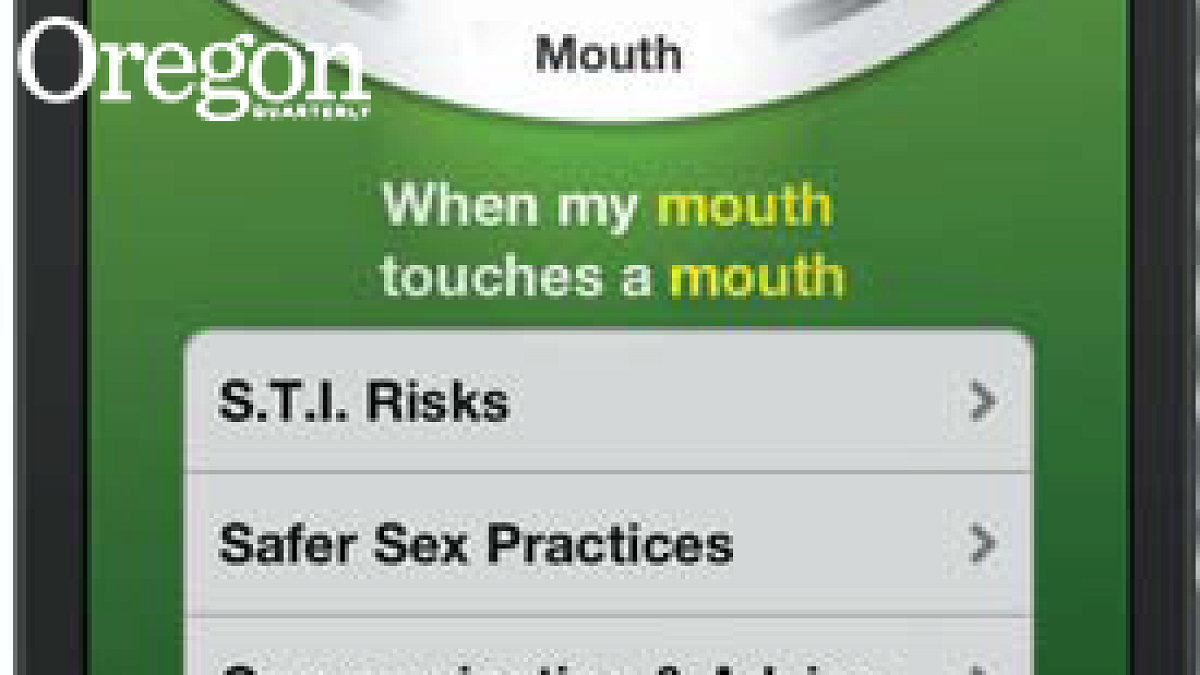Imagine you are 19 again, and newly in love. Your senses of humor match and you both get butterflies before your dates. When you're together, you emit a crackling chemistry. It's time to get physical.
This is where things can get awkward. Who starts the conversation about safe sex? How might you ask if your beloved is plagued by a sexually transmitted infection (STI)? What about communicating what you are or aren't ready for? In the past, the happy couple fumbled around for information. Maybe one of them had a book or a pamphlet. Maybe one of them had seen a poster.
But there's an app for that now. Since the fall, UO students have had access to the Sex Positive phone application, which offers a wealth of information on sexual issues, from safe sex practices and ascertaining one's risk of sexually transmitted infections to clearly communicating one's sexual boundaries.
The app uses a catchy feature of two spinning wheels—think 1960s television game shows—to boost the fun quotient of learning and communicating about delicate issues such as preference, protection, and process. The inner wheel, what project manager Keith Van Norman calls the "my" wheel, is divided into eight body parts. The outer wheel, called the "touches a" wheel, is divided into 16 body parts and objects. Those include the usual suspects, but also some newcomers such as "feathers," "food," "toe," or "vibrator."
App users can line up specific segments of the inner and outer wheels, depending on the information they're after, or they can let the two wheels spin and match up randomly. The app provides categories of information for each wheel pairing: STI risks, safer sex practices, advice, and communication. "The information for each pairing is specific to that touching," says Van Norman, health promotion marketing manager at the University Health Center.
The free app can be used on all Apple and Android phones and is available from the Apple and Google Play app stores.
As with past generations, the medium shapes the message for millennials. Van Norman was looking for a way to communicate sexual health information for college students that would be accessible, informative, fun—and in a format that speaks to them. Even though mores around sex have changed, Van Norman says, sex education has not kept pace. "Millennials are more open and expect a more open and frank discussion about sex," he says. "But we haven't updated our way of talking about it."
Van Norman says the app presents well-researched information in a nonjudgmental, noninvasive manner. It is gender and preference neutral. "It doesn't present sex as a bad thing," he says. "It's more, 'Here's a bunch of different options. Here's the information you need to know.'"
Renowned Seattle sex columnist Dan Savage spoke at the UO's Ford Alumni Center in October to promote the Sex Positive app. For Savage, people can't know enough about the panoply of sexual possibilities, and he encouraged even the virgins in the audience to spin the app's wheels. "Use the app. The app is great. Look around," he said. "The less you know [about sex], the more likely you are to get hurt. The less you know, the more likely you are to be taken advantage of."
Two years in the making, the app was developed at the UO geography department's InfoGraphics Lab and is a clearinghouse of sexual expertise from more than 100 sources, including faculty experts, student groups, and various departments. Along with providing basic information, it includes links to websites and videos, such as a lecture by UO biology professor Brendan Bohannan on properly cleaning the genital area and a talk by Sierra Dawson, senior instructor of human physiology, on the anatomy and physiology of orgasm. The Women's Center's Sexual Wellness Advocacy Team contributed videos about consent and starting conversations. For those wanting more scientific information, the app links to the Centers for Disease Control and Prevention. A button at the bottom of each screen gives users the option of calling the University Health Center, which has a 24-hour health information service staffed by health professionals.
All UO students pay a mandatory health fee, Van Norman says, but at least a third of them never come to the health center. The app extends the center's information services to more students, he says, plus it provides information that may help students avoid the need for sexual health care intervention.
Sarah Sprague, a UO senior and peer health educator, worked on the app's content but hadn't seen the finished product until it went live at the Apple App Store in late September. "It's a reliable and accessible way for students to get sexual health info," she says. "And the beauty of it is, it can be fun at the same time."
—By Alice Tallmadge, MA '87


